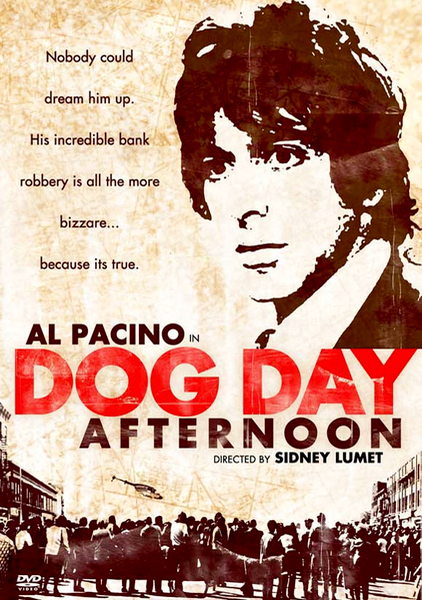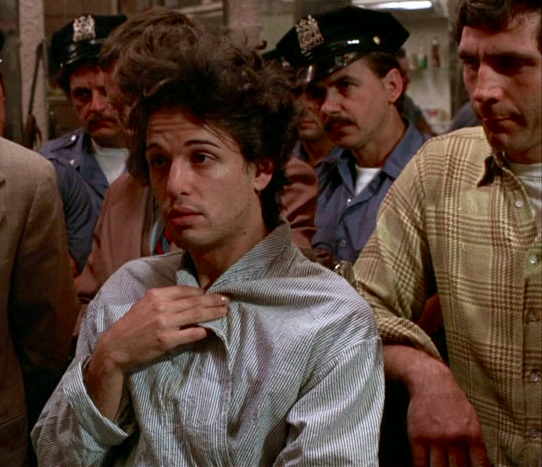“Dog Day Afternoon” (1975) is, at least for me, the most memorable NYC dramas directed by Sidney Lumet. Seeing it again for the first time since its initial theatrical release, I remembered a lot of what is in it, whereas I have only general memories of “Serpico,” another NYC drama, also starring Al Pacino that Lumet directed two years earlier or “The Pawnbroker,” starring Rod Steiger from 1964… or “Before the Devil Knows You’re Dead” (2007), Lumet’s last movie and first good one since 1990 (Q&A). And I rewatched “The Anderson Tapes”(1971) starring Sean Connery a matter of months after having seen and forgotten that I’d seen it.
As anyone with any interest in the movie knows, “Dog Day Afternoon” is a story, ripped from the headlines of a very inept bank robbery that led to two robbers (a third left before the robbery began) taking a Brooklyn (Avenue P Chase Manhattan) bank manager and his staff hostage. A major reason for the failure to get out was consideration for the staff, in particular the need of the head teller to go to the toilet before being locked in the vault. The bank employees sympathize with their captors — a very expedited Stockholm Syndrome.

And, despite being played by the usually swaggering, sniggering Charles Durning, the NYPD lead negotiator on the scene, Detective Eugene Moretti, is fairly sympathetic, trying to ensure that none of the hostages is injured or killed. The FBI agent Sheldon (James Broderick, father of Matthew) who takes over, Agent Sheldon, annoys both Moretti and the instigator of the robbery, army veteran Sonny (Al Pacino), who wants the money to pay for a sex-change operation for Leon Schermer (Chris Sarandon) whom he has married (despite having a legally recognized wife, pudgy motor-mouth Angie (Susan Peretz), who is the mother of their children.
Sonny is not very smart, but seems like a genius in comparison to his associate, Sal (John Cazale “The Godfather,” The Conversation,” and “The Deer Hunter” contained his other notable performances). Though Sal seems born to be the fall guy, Sonny refuses to sell him out (acquiesce in Sal being picked off as part of a surrender by Sonny). Sonny wants to make everybody happy: his male and his female wives, his partner in crime, the bank workers, at least. Though he is able to play to the crowd that gathers and get them cheering him and jeering the police, he is not able to make anyone happy, including Leon who is brought barefoot from Bellevue, heavily drugged with psychotropic “medicines.”
The movie is a black comedy that cannot end well for everybody. The news coverage is a satirical target warming up for “Network,” which Lumet directed in 1976 (it also prefigured Johnnie To’s “Breaking News” et al., prefigured by Billy Wilder’s “The Big Carnival”).
Being gay/whatever freedom/whatever month, my focus in watching the movie again was in examing matters of sexual orientation. Leon considers himself a woman in a man’s body and wants to rectify that: he’s a preoperative transsexual. Though there is little of the backstory of his relationship with Sonny, but I saw nothing to indicate that Leon felt that he had to be a woman for Sonny’s sake. Nor did I see any indication that Sonny could only love Leon if he were to shed his male genitalia. In the somewhat maudlin dictating of his will, Sonny refers to Leon as a man he loved (the past tense because the document will be read after Sonny is dead).

The real life model of Leon (who was 18, less than half of Chris Sarandon’s age) had a sex-change operation. And the real-life model of Sonny ) John Wojtowicz, an obviously not Italian name!) got into trouble breaking his parole to visit a second male husband, George Heath.
Sal in the movie is disturbed by news reports of “two homosexuals” holding hostages in the bank and pleads with the FBI agent to get his sexual orientation corrected in reports. Sonny does not react to the classification or later epithets (maricón for one). I wouldn’t hold him up as a model of “gay pride,” but at least the movie Sonny is not troubled by the labels “homosexual” and “gay.” He does not welcome a contingent of gay liberationist supporters who turn up and certainly does not evidence any analysis of sexual politics. He is a critic of the healthcare delivery system that has drugged Leon instead of performing the surgery Leon wants (and Sonny wants for him).
In The Celluloid Closet Vito Russo dismissed the movie as “the ultimate freak show, a film that used the sensational side of a true story to titillate a square audience,” going beyond “The Boys in the Band,” but learning of the motivation for the robbery did not turn the crowd against the bank robbers and at lest Detective Moretti treats Leon gently. A stray indicator that the audience maintained its sympathy for Sonny is the poster for the movie in the room of John Travolta’s character in “Saturday Night Fever” (leaving aside claims about Travlota’s sexual orientation!) and takes up the “Attica!” chant from the movie. Audiences of what was a hit movie may have shared the contempt for Leon of some of the cops on the scene, but seem to have maintained an affection for Sonny in the mess(es) he got himself into.
Victor J. Kemper’s cinematography is first rate (as in “Stay Hungry” the same year). The performances are superb. There is no soundtrack (after Elton John in the opening credits). I think that the movie could have been brought in under two hours of running time (though 125 minutes trimmed six from Lumet’s original (un)cut), but that’s a pretty minor complaint about an icon of New York movies and of 1970s cinema. The only Oscar the movie received was for best original screenplay (Frank Pierson), which is odd in that the screenplay was an adaptation of a LIFE mazagine article! Saradon lost to George Burns! (that Pacino was run over by the “One Flew Over the Cuckoo’s Nest” sweep, Jack Nicholson to be precise, is more understandable, though Pacino would get my vote; the other three best picture nominees were “Nashville,” “Jaws,” and “Barry Lyndon” btw; “Nashville” would have received my vote).
©2019, Stephen O. Murray

